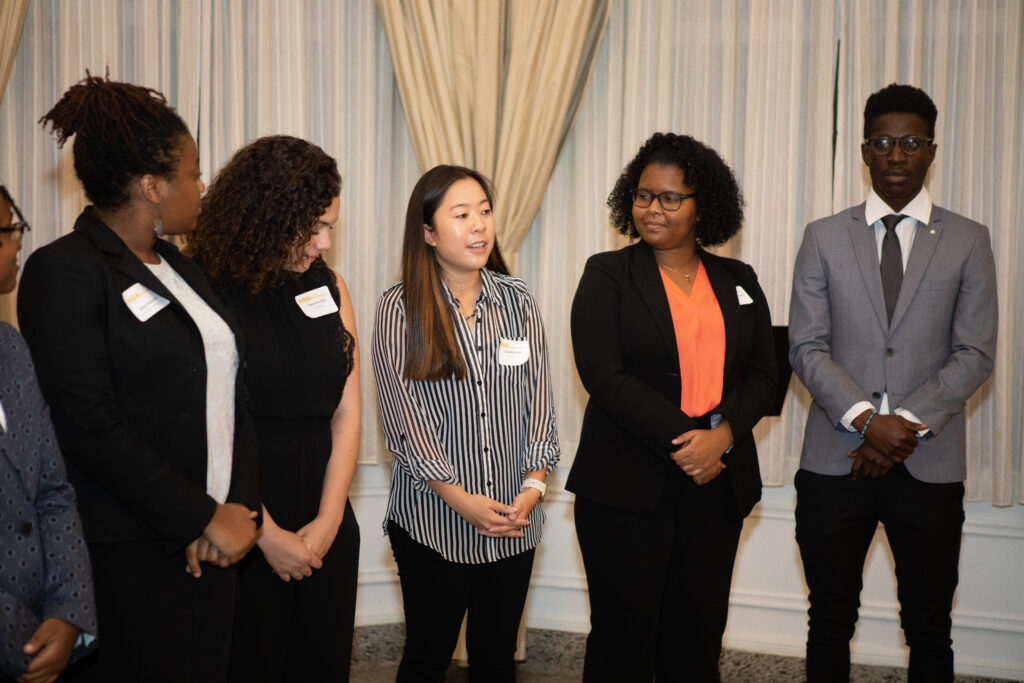Student Resources
Whether you’re exploring your interests, building new skills, or preparing for life after graduation, the McCree Center team is here to guide you every step of the way. From self-assessment tools to networking opportunities, internships, and career planning, you’ll find resources designed to help you grow with confidence.
Where are you in your career journey?


Self-Assessment and Career Exploration
Your career journey starts here
You don’t have to have your future career all figured out — especially not early on. Exploring is part of the process! Many students feel unsure at first, and that’s exactly why the McCree Center exists: to guide you as you uncover what inspires you and what paths might fit your skills, strengths, and goals.
Focus 2 is a self-guided career, major, and education planning system designed to guide you through the steps of the career planning process.
To set up your account use the access code squirrel123 and your MBU email address at the link below. We suggest you take the following assessments before your first appointment with you Career Design Advisor:
- Values Assessment
- My Academic Strengths
- Work Interest Assessment
An MBU career design advisor works directly with you to help clarify your career aspirations, craft compelling application materials, and develop strong networking and interview skills.
McCree Center events give you the opportunity to meet top employers, explore exciting job and internship opportunities, expand your professional network, and more.
Stay curious about various career options, and remember McCree Center resources are here to support you.
Our Career Design Advisors are here to help you think through your options, answer your questions, and connect you with hands-on opportunities to explore.
Skill Building and Networking
Become the professional employers want to hire
Your career journey isn’t just about choosing a major — it’s about building the skills and connections that will help you thrive after graduation. By identifying your strengths, growing your skillset, and connecting with industry professionals, you’ll be ready to make a difference in your career field.

Employers look for a blend of skills that demonstrate your ability to succeed:
| Skill Type | What’s it about? | Examples |
|---|---|---|
| Technical | Specific tools, software, or methods required for a profession | Data analysis, coding, writing, research |
| Power | Interpersonal and personal attributes that enhance workplace effectiveness | Communication, teamwork, adaptability, problem-solving |
| Industry-Specific | Specialized knowledge or competencies unique to a particular field | Legal research (law), patient care (health care), marketing analytics (business) |
Once you’ve identified the skills you’ll need, create a skill strategy to hone those abilities.
Evaluate your strengths: What are you already great at?
Spot the gaps: Where do you want to grow?
Take action: Join student organizations, attend workshops, complete internships, or step into student leadership roles to build your skillset.
Your professors and academic advisors are more than educators — they’re industry professionals with valuable connections. They can:
- Offer career advice and insights
- Recommend research opportunities
- Provide letters of recommendation
- Introduce you to professionals in your field
Pro tip: Stop by office hours and share your career interests — they want to help!
Your classmates today could become your collaborators tomorrow, and alumni are often eager to help fellow MBU students.
- Join campus clubs, organizations, and LinkedIn alumni groups
- Explore mentorship programs
- Reach out to alumni for advice; many are happy to share their journey
Remember: Networking isn’t just about landing your first job — it’s about learning from others, exploring opportunities, and building authentic relationships that support your long-term goals.
Career fairs, employer meet-and-greets, and industry panels are direct gateways to recruiters and hiring managers.
- Prepare a few thoughtful questions ahead of time
- Practice a quick introduction about who you are and what you’re interested in
- Follow up with a thank-you note or LinkedIn connection after the event
Not sure which path is right for you? Informational interviews are low-pressure conversations that give you a behind-the-scenes look at different careers.
- Reach out to alumni on LinkedIn
- Ask faculty or staff for introductions to industry professionals
- Keep it short (15–20 minutes is plenty) and ask about their career path, industry trends, and advice
Your digital footprint matters — employers often review LinkedIn and online portfolios before making hiring decisions.
- Use a professional headshot and a clear, compelling headline
- Craft an “About” section that highlights your skills, experiences, and goals
- Follow industry leaders, share relevant articles, and comment on posts to show your engagement
Ready to build your network?
Start small: connect with one professor, attend one event, or reach out to one alum this month. Every conversation opens a new door.
Internships and Career-Connected Learning
Get into the field and gain hands-on learning
Every internship, project, and connection you make now builds the foundation for your post-graduation success. Internships, micro-internships, research projects, and other hands-on experiences:
- Help you test-drive potential career paths before committing
- Build your resume with real, marketable skills employers want
- Expand your network of mentors, alumni, and industry professionals
- Often lead to full-time job offers or graduate school opportunities
At MBU, we want students to complete multiple career-connected experiences — from summer internships to part-time work to virtual projects that fit your schedule.

Before jumping into the “what’s next,” pause to reflect:
- What skills have you developed so far?
- Which experiences have shaped your interests?
- Are you clear on your direction — or ready to explore?
Action Step: Schedule a 1:1 with your Career Design Advisor to map your strengths, interests, and opportunities for internships or other career-connected learning.
Think of your career plan as a roadmap:
Short Term (This Semester)
- Identify industries or roles that excite you
- Research internship and work-based learning options on Handshake
- Attend career fairs and employer info sessions
Mid-Term (Next 6–12 Months)
- Complete an internship, micro-internship, or shadowing experience
- Join a student organization or leadership program to build transferable skills
- Begin graduate school or fellowship planning, if relevant
Long-Term (Before Graduation)
- Complete multiple career-connected learning experiences
- Build strong relationships with mentors and professional contacts
- Finalize your resume, cover letter, and interview skills
- Create a post-graduation action plan
Say “yes” to opportunities that give you real-world exposure — even if they’re small. Every step builds your story.

Next Steps – After MBU
Your future career starts here
Graduation isn’t the end — it’s your launchpad. Whether you’re heading straight into the workforce, attending graduate school, or taking time to explore, the McCree Center is here to help you make a confident next move.
From perfecting your resume to navigating offers, we provide the guidance, tools, and connections you need to transition successfully.
Clarity creates momentum. Be specific about what you want to achieve — whether it’s:
- Landing your first job
- Starting graduate or professional school
- Traveling or completing a fellowship
- Launching a passion project
Example: “Secure an entry-level marketing role by August 1.”
Big goals become achievable when you take them step-by-step.
Example: Job Search Plan
- Research 10 companies that align with your interests
- Update your resume and LinkedIn profile
- Draft tailored cover letters for each application
- Apply to at least five roles per week
Deadlines create accountability and prevent last-minute stress.
Example: “By the end of March, attend two career related events and submit five applications.”
Your connections are one of your most valuable assets.
- Attend career fairs, employer panels, and alumni events
- Reach out on LinkedIn for informational interviews
- Follow up with mentors, internship supervisors, and professors
- Say yes to introductions — doors often open through relationships
Use a tracker (spreadsheet, planner, or app) to stay on top of deadlines, applications, and follow-ups.
Pro Tip: Color-code tasks (e.g., “In Progress,” “Submitted,” “Interview Scheduled”) to see momentum at a glance.
Graduation doesn’t mean goodbye. As an alum, you’ll continue to have access to:
- Career advising
- Handshake’s job and internship databases
- Networking opportunities with fellow alumni
Your success is part of our mission, for life.